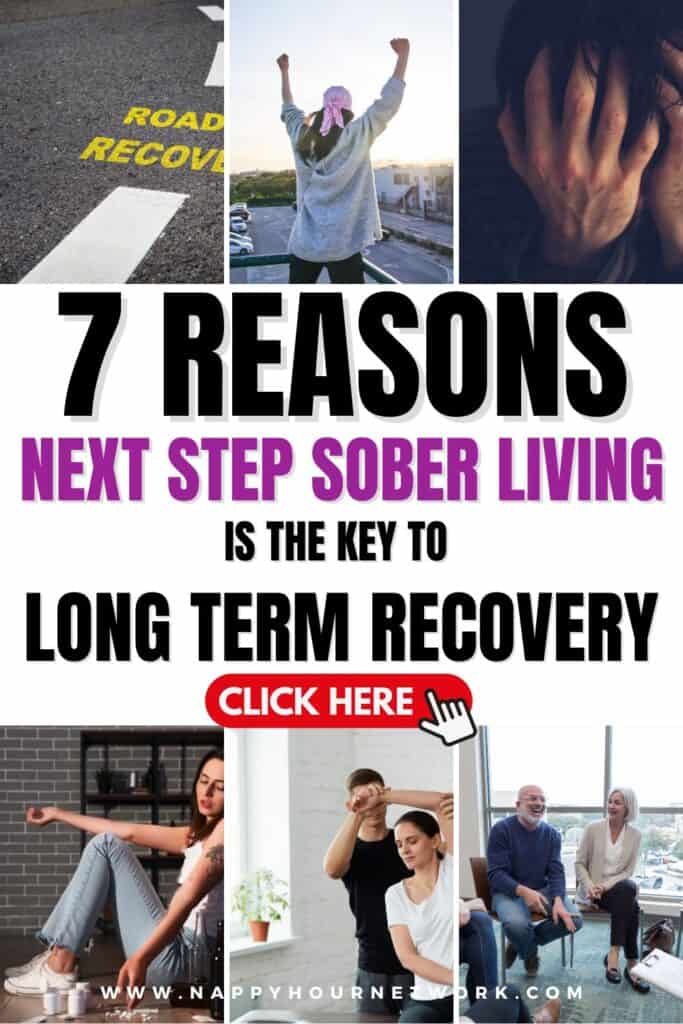If you are caring for someone on the journey to sobriety, it can be one of the most challenging yet rewarding experiences a person can undertake. For many individuals recovering from substance use disorders, transitioning from intensive treatment to independent living can be daunting. This is where sober living environments, particularly programs like Next Step Sober Living, come into play. These facilities provide essential support, structure, and a community that fosters healing. In this article, we’ll explore seven compelling reasons why Next Step Sober Living is a vital component of the recovery journey, ensuring that individuals not only maintain their sobriety but also thrive in their new lives.

*This post includes affiliate links, which means if you make a purchase through one of these links, I earn a small commission at no extra cost to you. This helps me keep providing high-quality content on this site for free. Rest assured, I only recommend products that I would personally use and believe will be helpful for my readers.
What is Next Step Sober Living?
Next Step Sober Living is a program designed to support individuals transitioning from treatment centers back into everyday life. It provides a safe, sober, and structured environment where residents can focus on their recovery while developing essential life skills. Unlike traditional rehabilitation facilities, sober living homes offer more independence, allowing individuals to integrate back into society gradually while receiving ongoing support.
In a Next Step Sober Living home, residents typically follow a structured daily routine that promotes accountability and stability. With house rules in place—such as sobriety checks and mandatory meetings—individuals are encouraged to engage with their peers and participate in community activities, all while focusing on their personal recovery goals.
Common Questions from Caretakers on Next Step Sober Living
1. What Should Caretakers Know About the Transition to Sober Living?
As a caretaker, understanding the transition to a sober living environment is essential for supporting a loved one recovering from drug addiction or alcohol addiction. Sober living programs serve as a vital next step in the recovery journey, providing a safe environment after inpatient treatment. Many individuals transition to sober living from residential treatment programs, where they have begun their first step towards sobriety.
The key components of sober living include a structured daily routine and a supportive community of peers. Residents often engage in group therapy and life skills training, which helps them prepare for independent living. Additionally, sober living homes provide a close-knit community that encourages accountability, reducing the risk of relapse during early recovery.
Caretakers should be aware of the privacy policies and regulations governing these environments. Each sober living home has its mission statement that outlines its goals and the types of support offered. Many programs emphasize long-term recovery, offering additional clinical support on a case-by-case basis, such as outpatient treatment programs and nutrition services.
It’s important for caretakers to communicate openly with staff members about any concerns regarding their loved one’s adjustment. Engaging in discussions about the sober living experience can also help you understand the resources available. Caretakers should focus on fostering a positive environment, encouraging personal growth and stability in their loved ones’ daily life. This approach can significantly impact the recovery journey, leading to a solid foundation for long-term sobriety.
2. How Can Caretakers Support Their Loved Ones in Sober Living?
Supporting a loved one in a sober living environment involves understanding the dynamics of addiction treatment and the recovery journey. Caretakers can play a critical role by providing emotional support while encouraging their loved ones to engage fully in the sober living program.
One effective way to support your loved one is by promoting the benefits of a supportive community of peers. Encourage them to participate in group therapy and connect with others in recovery. These interactions foster a sense of belonging and accountability. Additionally, caretakers should remind their loved ones that it’s okay to seek help when dealing with mental health issues or withdrawal symptoms. Recovery residences often provide access to extra clinical support, which is invaluable during challenging times.
Regular check-ins are essential. Caretakers should maintain open lines of communication to discuss feelings, challenges, and successes in the sober living program. This ongoing dialogue allows for a deeper understanding of the recovery experience and reinforces a strong foundation for long-term sobriety.
Another key aspect of support is helping your loved one establish healthy routines. Encourage participation in daily activities, whether it’s meal planning, exercise, or learning new life skills. These routines are crucial in the transition to independent living and can enhance the sober living experience.
Lastly, caretakers should educate themselves about the specific program their loved one is enrolled in. Understanding the mission statement and visions statement of the sober living house can provide insights into the values and practices that guide their recovery process. This knowledge will empower caretakers to be the best support for their loved ones.
3. What Resources Are Available to Caretakers of Individuals in Sober Living?
Caretakers of individuals in sober living programs have access to a range of resources that can enhance their ability to provide support. One of the primary resources is the sober living program’s staff members. These professionals can offer guidance, education, and strategies tailored to individual needs. Regular meetings with staff can provide valuable insights into your loved one’s progress and address any concerns that may arise during their recovery journey.
Online resources can also be beneficial. Websites like the Vanderburgh House provide a recovery home listing and detailed information about sober living options. These platforms often include testimonials and educational materials, helping caretakers understand the challenges their loved ones may face in sober living environments.
Community support groups specifically for caretakers are another excellent resource. These groups can offer emotional support and practical advice based on shared experiences. Many individuals find comfort in connecting with others who understand the complexities of addiction and recovery. Additionally, some programs offer workshops that focus on coping mechanisms and mental health strategies for family members.
Caretakers should also consider learning about the different treatment centers and their approaches to addiction recovery. This knowledge will empower them to engage in informed conversations with their loved ones about their next steps in recovery. Understanding the treatment options available, such as partial hospitalization programs or intensive outpatient programs, can help caretakers guide their loved ones effectively.
In conclusion, as a caretaker, staying informed and involved in your loved one’s sober living experience is vital. By utilizing available resources and fostering open communication, caretakers can create an environment that supports recovery and personal growth.
Recommended Resources for Caretakers
As a caretaker supporting a loved one in sober living, accessing reliable information and resources is crucial. Here are three authoritative sources that provide valuable insights into addiction treatment and mental health support.
1. National Institute on Drug Abuse (NIDA)
Website: NIDA.gov
The National Institute on Drug Abuse (NIDA) is a leading resource for addiction treatment statistics and research. This government agency provides comprehensive data on substance use disorders, treatment efficacy, and the latest developments in addiction science. Caretakers can find valuable information on various aspects of addiction, including trends in drug abuse, the impact of treatment programs, and ongoing research initiatives. Utilizing NIDA’s resources can enhance your understanding of the challenges your loved one faces during recovery and inform your support strategies.
2. American Addiction Centers
Website: AmericanAddictionCenters.org
American Addiction Centers offer a wealth of resources focusing on mental health and addiction. Their website features articles, guides, and tools designed to educate caretakers about the complexities of addiction. You will find detailed information on various treatment options, coping strategies for mental health issues, and how to support someone in recovery. Their resources are aimed at both individuals struggling with addiction and their support systems, making it an excellent tool for caretakers looking for actionable insights.
3. Substance Abuse and Mental Health Services Administration (SAMHSA)
Website: SAMHSA.gov
The Substance Abuse and Mental Health Services Administration (SAMHSA) is an essential resource for outpatient services for addiction. SAMHSA provides a comprehensive directory of treatment facilities across the United States, including sober living environments, outpatient services, and residential treatment programs. Their site includes information about various programs, funding options, and support for individuals dealing with substance use disorders and co-occurring mental health issues. Caretakers can utilize SAMHSA’s resources to locate nearby services and learn about the different pathways available for recovery.
By exploring these resources, caretakers can gain a deeper understanding of addiction treatment and better support their loved ones on their recovery journey.
7 Reasons Why Next Step Sober Living is a Vital Part of the Recovery Journey
Reason 1: Structured Environment for Early Recovery
One of the most critical elements of early recovery is having a structured environment. Many individuals leaving intensive treatment programs may struggle with the absence of routine, which can lead to feelings of uncertainty or anxiety. Next Step Sober Living provides residents with a daily schedule that includes activities such as house meetings, group therapy sessions, and recovery workshops.
This structure is vital because it instills a sense of responsibility and accountability among residents. By adhering to a routine, individuals are less likely to revert to old habits and are more equipped to handle the challenges of daily life. Research shows that individuals who engage in structured sober living environments have higher success rates in maintaining their sobriety compared to those who attempt to navigate recovery alone.
Reason 2: Supportive Community of Peers
Isolation is a significant risk factor for relapse. Next Step Sober Living fosters a supportive community where residents can connect with others who understand their struggles and triumphs. Building relationships with peers in recovery can be incredibly beneficial. Sharing experiences, challenges, and successes fosters a sense of belonging and accountability, which is crucial during this vulnerable time.
In sober living homes, group therapy and communal activities encourage residents to engage with one another and support one another’s recovery journeys. The power of peer support is well-documented; studies indicate that individuals who participate in recovery communities are significantly more likely to achieve long-term sobriety.
Reason 3: Safe and Sober Environment
A safe, sober living environment is paramount for anyone in recovery. Next Step Sober Living offers a drug- and alcohol-free space, free from the triggers that often lead to relapse. Residents are monitored by staff who ensure that house rules are followed, including regular sobriety checks.
Moreover, these homes often provide resources for mental health support, addressing issues such as anxiety, depression, or trauma that may accompany addiction. Research indicates that individuals who recover in supportive, sober environments experience lower rates of relapse, emphasizing the importance of a safe setting during recovery.
Reason 4: Focus on Personal Growth and Life Skills
Next Step Sober Living emphasizes the importance of personal growth and the development of life skills necessary for successful independent living. Residents are encouraged to participate in workshops and training sessions that focus on essential skills such as budgeting, cooking, job searching, and communication.
This focus on life skills is vital, as it helps individuals build a strong foundation for their future. By gaining practical skills and confidence, residents are better prepared to face the challenges of everyday life once they leave the sober living home. For example, individuals who learn how to manage their finances and cook healthy meals are more likely to maintain their sobriety and independence in the long run.
Reason 5: Individualized Care Plans
Every recovery journey is unique, and Next Step Sober Living recognizes that one-size-fits-all approaches do not work for everyone. The program offers individualized care plans tailored to meet the specific needs of each resident. This may include addressing co-occurring mental health disorders, providing medication management, and setting personalized recovery goals.
Personalized care plans ensure that individuals receive the support and resources they need to thrive. For instance, a resident with a history of anxiety may benefit from specialized therapy sessions, while another individual may need assistance with job placement. This tailored approach fosters a greater sense of ownership over the recovery process and can lead to more successful outcomes.
Reason 6: Integration of Clinical Support
Next Step Sober Living does not operate in isolation; it often collaborates with local outpatient treatment centers and therapists to provide clinical support for residents. This integration of care ensures that individuals have access to ongoing therapy, support groups, and medical services as needed.
Access to outpatient services and clinical therapies—such as Cognitive Behavioral Therapy (CBT) and Medication-Assisted Treatment (MAT)—is crucial for maintaining long-term sobriety. These services help residents develop coping mechanisms, address underlying issues related to their addiction, and enhance their overall well-being. Research indicates that individuals who receive both clinical support and peer support in sober living homes have significantly better recovery outcomes.
Reason 7: Transition to Independent Living
The ultimate goal of Next Step Sober Living is to help individuals transition smoothly from recovery into independent living. As residents progress through the program, they are encouraged to take on more responsibilities, such as finding employment, attending school, or managing their own schedules.
This gradual transition allows residents to develop the skills and confidence necessary to live independently while still having a supportive network in place. Success stories abound from individuals who have thrived after leaving sober living homes, often attributing their achievements to the foundational skills and support they received during their time there.
Next Step Sober Living is a critical resource for individuals seeking long-term recovery from addiction. By providing a structured environment, fostering supportive community connections, and focusing on personal growth and individualized care, these programs help residents navigate the complexities of early recovery. The combination of clinical support and life skills training ensures that individuals are well-equipped to face the challenges of independent living, ultimately leading to sustained sobriety and a fulfilling life.
For caregivers and families, understanding the importance of sober living environments like Next Step Sober Living can make all the difference in supporting their loved ones on their journey to recovery. By prioritizing these resources, we can empower individuals to reclaim their lives and thrive in sobriety.
FAQ Section
- What makes sober living different from inpatient treatment?
- Sober living offers more freedom while still providing structure and support. It allows individuals to gradually transition back into everyday life after completing a treatment program.
- Can sober living homes help with mental health issues?
- Many sober homes offer dual-diagnosis treatment, addressing both addiction and mental health disorders. This comprehensive approach enhances recovery outcomes.
- How long can someone stay in sober living?
- Typically, individuals can stay in sober living homes for three to twelve months, depending on their individual progress and needs.
- Is sober living suitable for people with co-occurring disorders?
- Yes, many sober living homes specialize in dual-diagnosis treatment, providing support for both substance use and mental health issues.
- What kind of support staff are available in sober homes?
- Staff may include recovery coaches, therapists, nutritionists, and support staff, all of whom are trained to assist residents in their recovery journeys.
- Can my loved one relapse while in a sober living home?
- While relapse can occur, sober living homes aim to minimize this risk through structured support, accountability, and a drug-free environment.
- Are sober living homes affordable?
- Many homes are designed to be affordable, and some offer sliding scale payments based on individual needs, making recovery accessible to a broader population.
By emphasizing the benefits of programs like Next Step Sober Living, we can help individuals in recovery take crucial steps toward a brighter, sober future.










